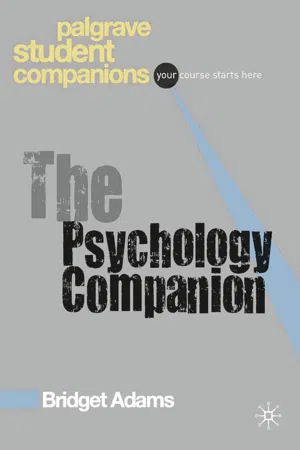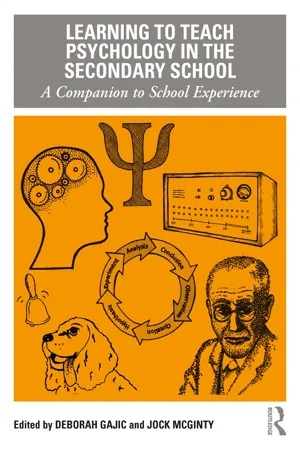Psychology
Subfields of Psychology
Subfields of psychology refer to the specialized areas within the discipline that focus on specific topics or populations. These subfields include clinical psychology, cognitive psychology, developmental psychology, and social psychology, among others. Each subfield applies psychological principles and research methods to understand and address different aspects of human behavior and mental processes.
Written by Perlego with AI-assistance
Related key terms
1 of 5
5 Key excerpts on "Subfields of Psychology"
- eBook - PDF
Majoring in Psychology
Achieving Your Educational and Career Goals
- Jeffrey L. Helms, Daniel T. Rogers(Authors)
- 2022(Publication Date)
- Wiley-Blackwell(Publisher)
Part II The Subfields of Psychology Majoring in Psychology: Achieving Your Educational and Career Goals, Third Edition. Jeffrey L. Helms and Daniel T. Rogers. © 2023 John Wiley & Sons Ltd. Published 2023 by John Wiley & Sons Ltd. Companion Website: www.wiley.com\go\helms\majoringinpsychology3e 8 Careers in Research Experimental, Developmental, Social, Cognitive, and Biopsychology Introduction The scientific process forms the core of psychology. Because all psycholo- gists are trained in how to design research, gather and analyze data, and consider the implications of results, research‐oriented careers occur in every subfield of the discipline. And because so many psychologists with diverse areas of focus are involved in research, it is impossible to capture all the variations within and among these careers in a single chapter. However, for several subfields in psychology, the likely careers almost always include a substantial emphasis on research. Although these research‐intensive sub- fields are quite varied in their focus and methods, we think that an overview of them as a group can provide you with a sense of what these types of careers entail. Before turning to research‐oriented careers in the field, let us first con- sider a key question. What is research? Research involves gaining knowledge about the world around us in a highly specific way. Every day you gain knowledge through such things as observing situations, reasoning about what happens, accepting the views of others, or experiencing things first- hand. However, each of these ways of coming to know something is prone to error and bias. In contrast, research uses methods and techniques that are specifically designed to ensure that the knowledge gained is as objective and accurate as possible. Scientists across different fields use research methods 200 The Subfields of Psychology and techniques to answer questions relevant to their work. - eBook - ePub
Personality Theories
Critical Perspectives
- Albert Ellis, Mike Abrams, Lidia Abrams(Authors)
- 2008(Publication Date)
- SAGE Publications, Inc(Publisher)
A common difficulty encountered by beginning students in psychology is trying to gain a clearer understanding of exactly what psychology is. If you are reading this text, you probably have been exposed to articles about psychology or have even read other psychology textbooks in their entirety. If this is the case, you may have been a bit confused by the fuzzy definitions of psychology that you have been given. The reason for this uncertainty is that there is no universal consensus about the nature or scope of the discipline. Rather than being a distinct topic of study, the field of psychology is comprised of a cluster of closely related subjects. Most of these have their own research agendas, their own styles of practice, and their own views of the most desirable direction for the field as a whole.The diversity of subfields within psychology has been a problem since the discipline’s inception and remains so in the early 21st century. You can easily verify this observation by examining the constituencies of the American Psychological Association (APA). The APA is the largest organization dedicated to the advancement of the field of psychology. Table 2.1 lists the major subdivisions of the American Psychological Association. Although there is a large amount of overlap, the table makes clear that psychology as a field contains many distinct areas of study and practice.An examination of these divisions reveals overlap in some areas and apparent disagreement in others. Nevertheless, this pattern of division and separation is the way psychology evolved in the 19th and 20th centuries. This chapter explains how and why it did so and the significance these divisions have had for the various theories of personality.THE BIRTH OF PSYCHOLOGY
Prior to the late 19th century, psychology was generally considered a subfield of philosophy. Philosophers debated such topics as the relationship between body and mind, the basis of consciousness, the freedom of the human will, and the nature of goodness, truth, and beauty. Some, like Immanuel Kant (1724–1804), even theorized about nonconscious thought. Despite all the debates and publications, however, psychology remained an academic abstraction rather than an empirical science. This situation changed dramatically when William James (1842–1910) in the United States and Wilhelm Wundt (1832–1920) in Germany established laboratories dedicated to the study of psychology.1 - eBook - ePub
- Bridget Adams(Author)
- 2009(Publication Date)
- Bloomsbury Academic(Publisher)
Psychology is one of the behavioral sciences – a broad field that spans the social and natural sciences. Psychology attempts to understand the role human behavior plays in social dynamics while incorporating physiological and neurological processes into its conceptions of mental functioning. Psychology includes many sub-fields of study and application concerned with such areas as human development, sports, health, industry, law, and spirituality. (http://en.wikipedia.org/wiki/Psychology, accessed June 2008). Pinker (1998): Psychology is engineering in reverse. In forward engineering, one designs a machine to do something; in reverse engineering, one figures out what a machine was designed to do. The emphasis in all academic and experimental psychology is on using scientific research procedures and presenting findings for debate. See also Parts 2 and 5. In many contexts, the term psychology also encompasses psychoanalytical, psychodynamic or depth approaches and person-centred or humanistic approaches in interpretation of art and in psychotherapy and counselling. These are based on clinical studies not experimental research, but many psychology courses include some reference to them for completeness and to open up these areas for debate. Two things academic psychology is not: Psychology does not include psychiatry. Psychologists do not read minds and most do not interpret dreams as part of their professional training or practice. Many hospital and community mental health care teams include a psychiatrist and a psychologist, together with some form of psychotherapy or counselling. A psychiatrist is a medical doctor who specialises in diseases of the brain and mental illness and who usually has not studied psychology. The focus is on medication or surgery to treat recognised symptoms - eBook - PDF
Early Childhood Studies
A Social Science Perspective
- Ewan Ingleby(Author)
- 2012(Publication Date)
- Bloomsbury Academic(Publisher)
This branch of psychology takes a holistic approach consider-ing that the person is in totality greater and more complex than his or her individual characteristics. This in turn complicates a focus upon the external factors producing thoughts and behaviour. Psychology and Early Childhood Studies 7 Psychodynamic psychology A further criticism of behaviourism developed through the twentieth cen-tury as a result of the legacy of Sigmund Freud, possibly the most famous psychologist of all. Malim and Birch ( 1998, p. 9) argue that Freud proposes that the mind is a combination of conscious and unconscious thoughts. If we accept that this is the case, Freud’s theory can be used to challenge behav-iourism because it implies that human thought and behaviour is more com-plex than the behaviourist notion that external variables cause thought and behaviour. Cognitive psychology Alongside psychodynamic theory there emerged a further significant theory that places the emphasis upon thinking processes or cognition, in other words the ways in which we attain, retain and regain information. Within cognitive psychology an emphasis is placed on identifying what happens within the mind after a stimulus has been received. The mind is seen as being like an information processor, almost akin to a computer. Malim and Birch ( 1998, p. 25) explain this perspective by arguing that ‘human beings are seen as infor-mation processors who absorb information from the outside world, code and interpret it, store and retrieve it’. In a literal revolution of thought, think-ing has come back full-circle and the initial criticism of introspection being unlikely to explain the complexity of human thought is asserted within this psychological theory. Biological psychology This view is reinforced by some of the current developments within psy-chology. - eBook - ePub
Learning to Teach Psychology in the Secondary School
A Companion to School Experience
- Deborah Gajic, Jock McGinty, Deborah Gajic, Jock McGinty(Authors)
- 2022(Publication Date)
- Routledge(Publisher)
3 Teaching Areas of Psychology
Deborah GajicDOI: 10.4324/9781003162223-4Introduction
Areas in psychology, sometimes known as approaches or themes (depending on the qualification being studied), are central to psychology; they are the paradigms used to try and explain the diversity of human behaviour. In England and Wales, OFQUAL (2014/2015) has deemed the areas we will examine in this chapter as core areas for A/AS and GCSE level. National 5 and Highers in Scotland cover Individual and Social behaviour, but within these broad areas also cover the core areas covered in this chapter. Other qualifications may vary, but all will include these core areas in some form.It is unlikely that you will be asked to teach a whole core area during your teaching practice; you will most likely be given a topic or a series of lessons to plan and teach. However, an understanding of core areas of psychology is important in order for students to make connections between their learning and develop a synoptic level of knowledge and understanding. Therefore, it is vital that you understand where the topic or lesson you have been asked to teach fits into the broader picture. Make sure you have read the specification for the qualification you are teaching and understand the links between topics and core areas. It is important to know what students already know so that you can build on their prior knowledge. Although it is tempting, when time is short, to just focus on the minutiae of your lesson plan, it is necessary to apply a meta-cognition approach and consider where your lesson fits into the overall scheme of work (see Unit 2.2 on lesson planning and schemes or units of work inCapel et al.
Index pages curate the most relevant extracts from our library of academic textbooks. They’ve been created using an in-house natural language model (NLM), each adding context and meaning to key research topics.




